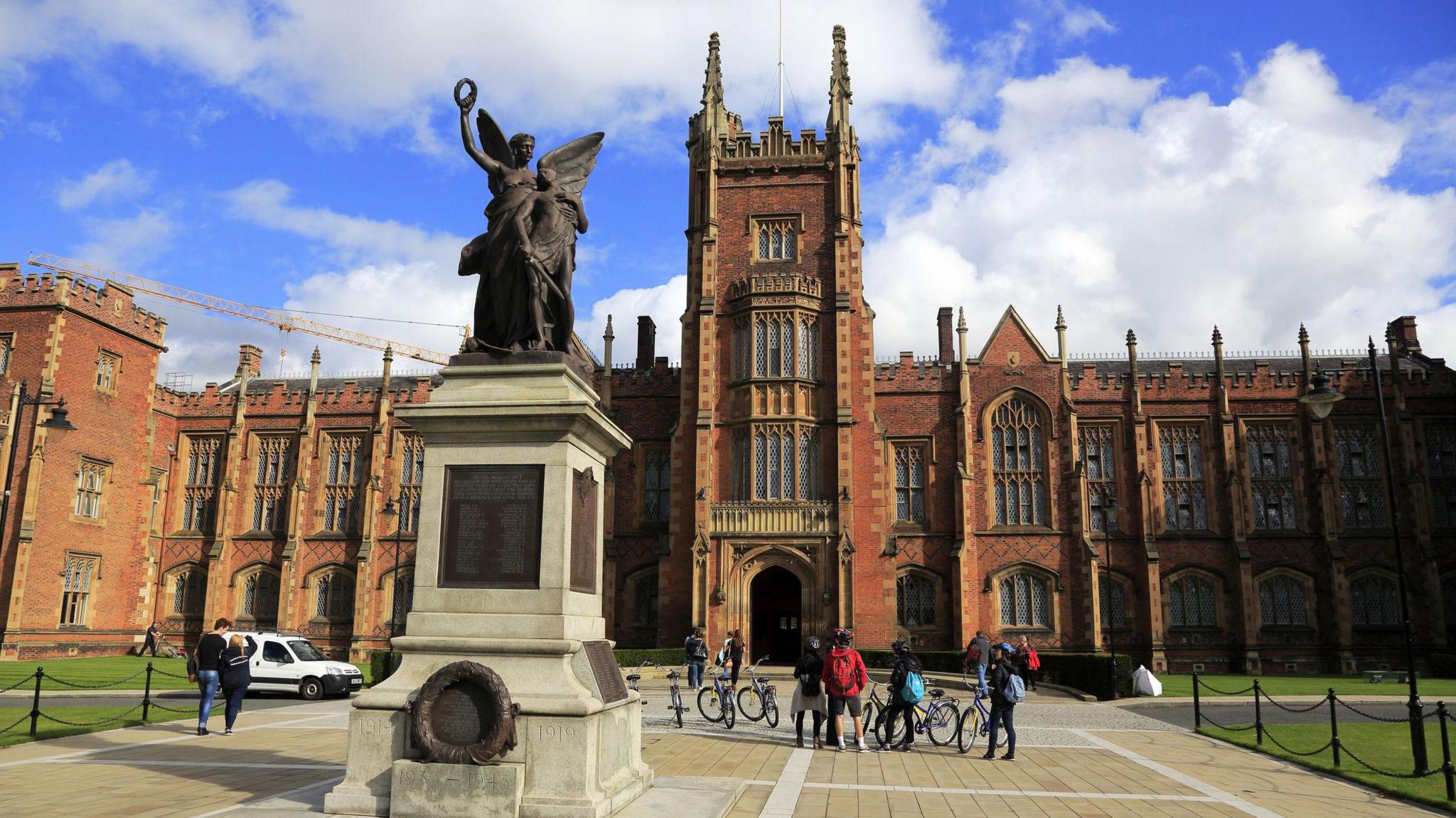QUB denies staff pressured to give higher grades

A whistleblower claims lecturers feel under pressure to increase marks
- Published
An email seen by BBC News NI suggests to some staff at Queen's University Belfast (QUB) that they should note that higher marks are awarded at competing universities when considering how to grade their own students.
The internal email to staff at the QUB Business School tells them to "please bear this in mind" when marking students work.
A whistleblower, who spoke to BBC News NI anonymously, claimed lecturers felt under pressure to increase marks.
But a university spokesperson said it "completely and absolutely refutes any suggestion that staff in its Business School have been put under pressure of any kind to inflate the grades of our students".
In a statement, the spokesperson also said the university had "a stringent oversight mechanism involving multiple levels of internal and external scrutiny and quality checks of teaching, assessment, and marking processes".
"Drawing on data from comparable universities and programmes is one aspect of this process - to reiterate, this is a standard practice and in no way exceptional," they continued.
'Should be looking towards' higher average marks
The Business School is one of the university's major departments, with about 150 academic staff.
The email sent to staff in the school during the May 2024 exam marking period said that Queen's was awarding marks "around seven percentage points less" than for Russell Group comparators.
It said the average mark for final year modules in Business Management was "around 59".
"As you are marking over the next few weeks, please be aware of how comparable institutions (and other Schools at Queen's) are grading," it said.
"To achieve similar degree classifications to other Russell Group management programmes our initial analysis suggests we should be looking (at Programme level) towards average marks of 62 in first year, 64 in second year and 66 in the final year.
"Please bear this in mind while marking and moderating modules."
The email said fuller guidance would be published for staff by the school.
But it also told them that if the module or course they were marking "is likely to deviate more than two-three percentage points from these averages, please speak to your programme director(s) in the first instance".
"They can work with Heads of Department and the UG Director of Education to consider adjustments."
UG stands for undergraduate, but the whistleblower claimed to BBC News NI that some staff also felt under pressure over marks for postgraduate qualifications.

The Russell Group is the umbrella name for 24 leading universities across the UK, of which Queen's is a member.
The email sent to staff in the QUB Business School also included analysis carried out by a named senior staff member comparing degree grades awarded at Queen's for Business Management and those awarded in Management Studies at other Russell Group universities.
It said that while, for instance, 14% of QUB Business Management degrees were awarded the top 1st grade, around 35% of Management Studies degrees at other Russell Group universities were awarded a 1st.
"We should be considering these distributions when marking," the document said.
'No way exceptional'
When contacted by BBC News NI, a QUB spokesperson said it "completely and absolutely refutes any suggestion" that staff in its Business School were put under pressure to inflate the grades of students.
"As a leading university across the UK and Ireland, and member of the Russell Group, we - like other universities - apply a variety of metrics to continuously benchmark our students against a range of peer institutions in relation to student outcomes and the employability prospects of our graduates," they continued.
"This data-driven approach underpins our quality assurance and enhancement processes and is completely consistent with practice within the UK and internationally.
"We follow a rigorous governance process in the design and delivery of all our programmes with robust quality assurance mechanisms in line with national regulatory frameworks, with our programmes maintaining accreditations with reputed international professional bodies where relevant.
"As a Russell Group university, we are continuously reviewing how we assess right across the University as technology continues to evolve and change the way students learn, and we have a stringent oversight mechanism involving multiple levels of internal and external scrutiny and quality checks of teaching, assessment, and marking processes.
"Drawing on data from comparable universities and programmes is one aspect of this process - to reiterate, this is a standard practice and in no way exceptional."
Concerns have been previously expressed about grade inflation at other universities in the UK.
The Office for Students (OfS) in England had previously warned English universities that they were giving too many students top degree grades.
- Published12 May 2022

- Published9 August 2024

- Published28 June 2023
